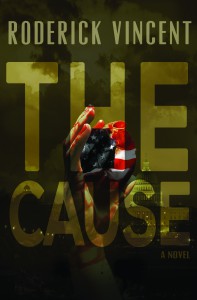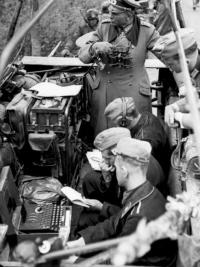
 Chapter 1
Chapter 1
“Man cannot discover new oceans unless he has the courage to lose sight of the shore.”
-André Gide
May 13th, 2026
There it is—a blue marble in the blackness of space, sweeps of white fuzzing the spherical surface, so small you can put your thumb over it and blip it out of existence. The Earth, suspended in the darkness, silent and fragile. But this is deception. It’s moving very fast, and just because you can’t see and feel it, doesn’t mean it’s not the truth.
The moon photo of the Earth was shot by astronaut Timothy Skies, who said if he could drag the world’s politicians up into space, choke them by the necks and say, take a look at that you bastards, perhaps there might be a way forward. I don’t share his optimism, but it’s a perspective few have had the luck to experience—witnessing another gravity—standing in greyish moon dust, kicking up clumps of it only to see it slowly float in a snowflake sprinkle back to your feet.
I liked the shot and kept it tucked underneath my SWAT uniform and flak jacket, pinned over my heart. A good-luck charm through the bank-heist gun battles, the crack-house raids, and the L.A. riots that erupted in 2022. It was then, through the conflagration of 7th Street when I saved Timothy Skies and his wife from the Charleston Building under a hail of sniper fire.
The day before, nearly all of us were called in for riot duty. The National Guard had been called up, but hadn’t arrived. We lined up outside L.A. Superior Court looking like helmeted centurions. We stood shoulder-to-shoulder uneasily with our full-length polycarbonate riot shields in front of us, black truncheons in hand. The crowd was massed in front of us on Erwin Street, an ocean of humanity boiling in a sea of anger over sweeping cuts to city pensions. L.A. was going bust, and the 6:00 news had carried the hard reality. Fissures of angst were like cracks in the pavement over promises that couldn’t be kept.
Two DARPA BigDogs stood on each of our ends, machineguns mounted on their backs armed with rubber bullets. Taller than the old models, they stood head-high. Their strange, articulating black metal legs were in a standstill march, as if about to charge. They had attached heads to the things. As the red camera eyes within swiveled back and forth, the dogs glowered, showing their sharp, metallic teeth.
This was a mistake, I had told Sergeant Smith. You don’t want to agitate the crowd. You don’t want to antagonize. You want to play defense. Smith told me it was above his pay grade, that a level of curiosity above him was eager to know how they’d perform.
Even with my helmet capped over my ears, the crowd’s yelling and shouting grew to a wave of stadium noise. The air vibrated with tension. The mob just in front of us hurled rocks, yelled out taunts. Then someone threw a Molotov cocktail at us and the guns atop the BigDogs started firing. The first row of instigators went down, but the second line had shields—some metallic, some like ours. Canisters of tear gas were lobbed into the crowd but many of the protesters had masks. Like insects, their rage pitched higher into a war cry. Then the line charged. We dug our back feet into the pavement anticipating their surge. A Peacekeeper drone flew over and dusted the crowd. Too late. A melee. Chaos. One of the BigDogs charged through the crowd. One of the last things I remembered was a severed arm inside its jaws. The wall of police split apart by the spears of arms and legs unafraid of the whacks of our clubs. I began clubbing people until the swarm fell upon me, kicking and beating me until I fell unconscious.
The day after, the city was still in flames. A gang had looted a gun store and targeted police and pedestrians not smart enough to flee for cover. Some of the wounded we pulled to safety, but a couple of people were already shot dead. Red pools of blood coagulated in the streets. Bloody boot prints led to the cement blockade four of us hid behind in a vacant lot. Crouched down and pinned by snipers firing from rooftops, we saw a group waving inside the Charleston. Fire licked the walls out of the windows of the second and third floors. Billowing plumes of toxic black smoke gusted into the air. Soot rained down on us cloaking our uniforms in black flakes and ash. It was snowing in L.A., a blizzard of flames spreading throughout the city.
Another spray of bullets cracked around us. “Hold your position,” Sergeant Smith ordered. “The BigDogs are on their way.” I smiled at him and took a big breath. He grabbed my arm, but I shook him off. He looked at me knowingly as I darted out into the fray. Many officers in the department were fooled by what I did. Some thought it a play against the robots. But it hadn’t been so long since I had been declared fit for duty. The guys who knew me guessed the reason I jumped off the gangplank into a sea of gunfire had nothing to do with heroics or saving police jobs as much as it did about having nothing more to lose. It was a monster dare, diving at the jaws of the Kraken. A game of chicken I was willing to lose.
The ground lit up underneath me. Dodge-and-weave and run like hell. Automatic fire punctured the streets, the roads opening like spores from a seedpod. The Charleston puffed in little white mushroom clouds from M16 rounds as I ran toward the middle of the street. I hopped into the armor plated SWAT-H mobile and put it into drive. Gunfire pinged against the sides and roof. I threw it into reverse and drove ass-ended straight up to the Charleston’s front door so Timothy Skies and the rest of the occupants could pile in.
Three months later, in the fall of 2022, Timothy Skies invited me to one of those Apollo 15 nostalgia dinners in Tucson. A token of gratitude for what he called the courageous officer. A sentimental thing for me to do—to go to such an event. But as a boy, astronomy fascinated me. For my thirteenth birthday my father gave me an Orion Dobsonian telescope. On the weekends we could afford it, we’d drive away and camp, hike out into the darkness and set it up on an open field or weedy bluff and gaze at moon craters and the lumpy lunar landscape. Then we’d rotate it toward the rings on Saturn, watch the perfect geometry of water and ice in retrograde motion. Farther out into space the gassy clouds of the Orion Nebula hovered above us in a creamy light. Back then, the highway miles between the campsite and L.A., and the light years to Alpha Centauri seemed to be about the same.
What my father would never know was how such a small, seemingly innocuous gift, would shake history. How it would change not only my future, but turn the eyes of the world.
The Timothy Skies Space Benefit Dinner was a champagne affair, a five-thousand-dollar-a-plate kind of fundraiser to send a man to Mars. Hosted by Virgin Galactic, banners posted around the place read: Let’s Take the Next Step for Mankind. The clutter of cross-table chitchat bounded over the clink of flutes and origami napkin swans. The penguined waiters answered to a nod, bustling around us with monogrammed white towels tucked over their sleeves, refilling our glasses the moment they hit half-empty. Mr. Skies and I sat next to one another. Presented as the hero, I found all of the fawning over the ordeal embarrassing. I wasn’t there for glory or gratitude and became annoyed as the story heightened from basic fact to tall tale.
Categories:
0 comments on this article







